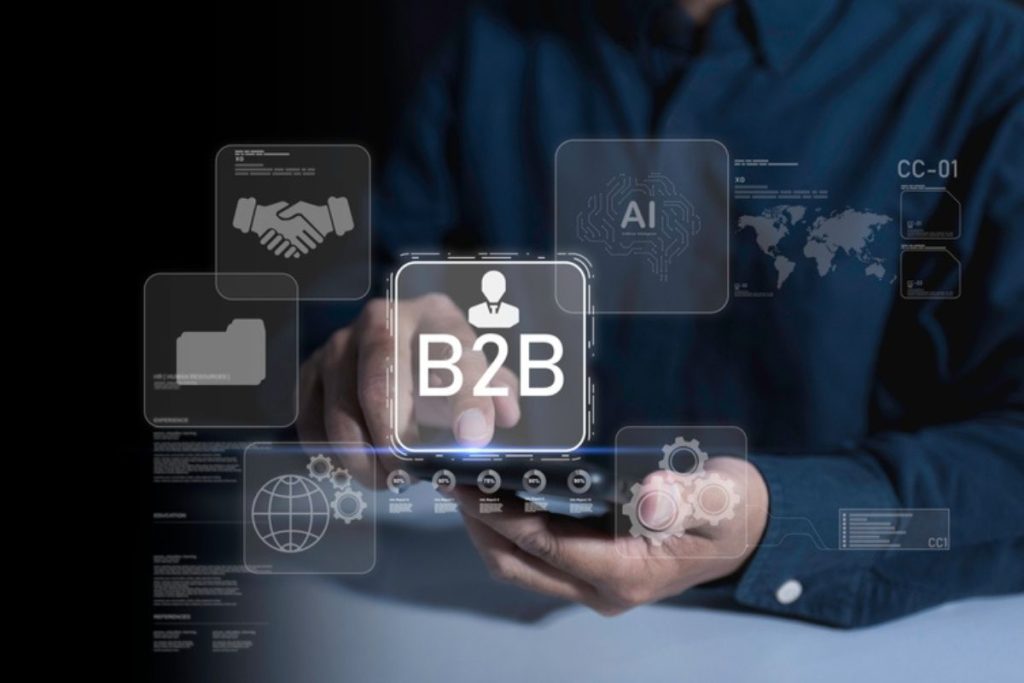Change Your Service: Just How AI Automation Is Transforming B2B Operations
AI automation is reshaping B2B procedures in significant means. Companies are adopting this innovation to enhance process and improve efficiency. As jobs become automated, businesses can focus on strategic growth instead of mundane processes. The effects of these adjustments are extensive, influencing whatever from client communications to provide chain administration. Understanding this transformation is important, as the future of service depend upon the effective integration of AI into daily procedures. What exists in advance in this developing landscape?
Recognizing AI Automation in B2B Context
As companies progressively look for efficiency, recognizing AI automation within the B2B context becomes crucial. AI automation describes the application of man-made intelligence technologies to improve and boost company processes. In B2B settings, this can show up in various kinds, such as automating information access, maximizing supply chain logistics, or boosting supply administration. Organizations leveraging AI automation can lower operational prices, lessen human mistake, and rise efficiency. In addition, AI devices can analyze huge quantities of information to offer workable understandings, enabling educated decision-making. B2B Growth Consulting. The assimilation of AI into B2B procedures not just transforms conventional operations yet also fosters agility and scalability, enabling organizations to adapt to market modifications quickly and effectively. Accepting this modern technology is essential for staying affordable in today's electronic landscape
Enhancing Customer Experience With AI
Just how can AI change client communications in the B2B industry? AI enhances consumer experience by supplying individualized, prompt, and reliable solution. Digital assistants and smart chatbots can deal with questions 24/7, guaranteeing clients receive immediate actions. Growth Systems For B2B. Predictive analytics enable services to prepare for customer needs, tailoring offerings as necessary. AI-driven platforms can examine customer information, enabling targeted advertising techniques and improved interaction. Furthermore, sentiment analysis tools assess client feedback, helping organizations adjust their solutions. By automating routine jobs, AI maximizes human resources to concentrate on high-value communications, fostering more powerful relationships. The integration of AI not only streamlines communication however additionally constructs count on and commitment, inevitably raising the overall consumer experience in the competitive B2B landscape

Improving Supply Chain Administration With AI
AI plays an important function in enhancing supply chain administration with predictive analytics and automated supply control. By leveraging anticipating analytics, businesses can prepare for need variations and adjust their procedures appropriately. Automated stock systems even more boost efficiency by guaranteeing supply levels are preserved, reducing waste and enhancing overall efficiency.
Anticipating Analytics Benefits
While several companies encounter difficulties in taking care of complex supply chains, predictive analytics supplies a transformative solution by leveraging vast amounts of data to anticipate fads and maximize procedures. By evaluating historic data along with real-time inputs, predictive analytics enables firms to determine patterns and prepare for future needs. This foresight permits even more educated decision-making, boosting efficiency and minimizing costs. In addition, companies can proactively deal with potential disruptions by forecasting supply chain traffic jams and readjusting strategies as necessary. The integration of predictive analytics not just enhances stock administration however likewise promotes more powerful connections with vendors and clients through timely feedbacks to market changes. Ultimately, the fostering of predictive analytics empowers companies to remain competitive in a significantly vibrant organization setting.
Automated Stock Control
As services progressively rely on anticipating analytics to maximize supply chain operations, automated inventory control emerges as a powerful ally in this effort. By leveraging AI-driven modern technologies, business can enhance precision in inventory tracking, decrease stockouts, and reduce excess supply. Automated systems evaluate real-time information, allowing companies to predict demand variations and adjust stock levels as necessary. This not just improves order gratification but additionally improves capital management by minimizing holding expenses. Furthermore, AI can determine patterns in acquiring habits, making it possible for even more enlightened decision-making pertaining to distributor partnerships and purchase strategies. Inevitably, automated stock control not just increases functional performance yet likewise enhances customer fulfillment by making certain product availability, solidifying its function as an important part in modern supply chain administration.
Data-Driven Choice Making Powered by AI
In today's affordable landscape, companies increasingly count on data-driven decision-making to enhance functional efficiency and critical preparation. Expert system plays an essential function in this transformation by evaluating vast amounts Continued of data promptly and accurately. AI algorithms recognize patterns, patterns, and anomalies that human experts could neglect, enabling companies to make educated choices based upon real-time understandings. This ability permits firms to predict market changes, optimize source allowance, and customize their offerings to client needs. Furthermore, AI-driven analytics promote threat analysis and management, making certain that organizations can navigate unpredictabilities properly. By leveraging these sophisticated tools, organizations not just improve their decision-making processes yet likewise gain a competitive benefit in their corresponding markets, promoting growth and advancement.
Automating Repeated Jobs to Boost Efficiency

Integrating AI With Existing Organization Processes
Many organizations face difficulties when integrating AI with existing business processes. These difficulties often stem from a lack of recognizing pertaining to just how AI can match current process. Effective assimilation requires a comprehensive evaluation of existing procedures to identify locations where AI can include worth. Organizations needs to also ensure that their groups are geared up with the essential abilities to utilize AI tools successfully. On top of that, smooth combination depends upon the compatibility of AI modern technologies with legacy systems. Firms usually locate it valuable to adopt a phased method, piloting AI applications in details divisions prior to a wider rollout. This technique permits changes based on first responses, guaranteeing smoother changes and taking full advantage of the possible advantages of AI automation in boosting performance and efficiency.
Future Trends in AI Automation for B2B Firms
As B2B companies want to the future, improved information analytics is readied to play a critical duty in driving decision-making processes. Intelligent process automation will additionally become a key trend, enhancing and simplifying procedures efficiency. These advancements assure to improve how services run, inevitably bring about even more responsive and active organizations.
Improved Information Analytics
While organizations significantly rely upon data-driven decisions, the function of AI in enhancing information analytics is ending up being more essential in B2B operations. AI innovations assist in the collection and evaluation of vast datasets, enabling companies to uncover useful insights that drive tactical planning. Anticipating analytics powered by AI permits organizations to anticipate market patterns and customer actions with higher precision. In addition, maker knowing algorithms boost data analysis, determining patterns that human analysts may forget. This causes more educated decision-making and optimized resource appropriation - Minarik AI. As B2B firms proceed to accept AI-driven analytics, they can anticipate better functional performance, enhanced client experiences, and an one-upmanship in the market. The future of information analytics in B2B depends upon incorporating advanced AI capacities
Intelligent Refine Automation
Intelligent Refine Automation (IPA) is poised to change B2B procedures by seamlessly incorporating AI modern technologies with conventional business processes. This innovative approach incorporates robot process automation (RPA) with innovative AI capacities, enabling companies to improve effectiveness and precision. Companies can automate repetitive jobs, such as data entry and billing handling, enabling staff members to concentrate on strategic campaigns. IPA additionally leverages artificial intelligence and natural language handling, enhancing decision-making with real-time data evaluation. As companies progressively embrace IPA, they can anticipate significant expense decreases and boosted consumer experiences. Future trends indicate a growing reliance on IPA for scalability and adaptability, placing organizations to thrive in an ever-evolving marketplace. Welcoming IPA will certainly be vital for maintaining competitiveness in the digital age.
Regularly Asked Inquiries
What Industries Benefit A Lot Of From AI Automation in B2B Workflow?
Manufacturing, logistics, finance, and medical care industries profit most from AI automation in B2B operations. These fields take advantage of automation to enhance effectiveness, decrease expenses, improve processes, and enhance decision-making through data-driven insights and predictive analytics.
Just How Can Small Companies Apply AI Automation Effectively?
Small companies can execute AI automation effectively by identifying repetitive tasks, choosing appropriate devices, integrating remedies gradually, training team, and constantly assessing performance to optimize procedures, optimizing and ensuring a smooth transition effectiveness. AI Automation For B2B.
What Are the Costs Related To AI Automation Application?
The expenses connected with AI automation implementation generally include software application acquisition, framework upgrades, educating team, recurring maintenance, and prospective assessment costs. These costs can vary considerably based on the scale and intricacy of the automation services chosen.
How Do I Gauge ROI From AI Automation Initiatives?
To measure ROI from AI automation efforts, one must analyze expense savings, efficiency improvements, and profits development against execution expenses. Tracking key efficiency indicators over time offers beneficial insights right into effectiveness and overall roi.
What Skills Are Required to Handle AI Automation Projects?
Efficient management of AI automation tasks calls for skills in job management, data evaluation, programs, and understanding AI innovations. Furthermore, strong interaction, analytic capabilities, and flexibility are essential for navigating the intricacies of such efforts.
As companies progressively seek effectiveness, comprehending AI automation within the B2B context ends up being essential. The combination of AI into B2B operations not just changes conventional workflows however also fosters dexterity and scalability, enabling companies to adjust to market adjustments promptly and successfully. While services significantly count on data-driven decisions, the function of AI in boosting information analytics is coming to be more vital in B2B procedures. Intelligent Refine Automation (IPA) is positioned to revolutionize B2B operations by perfectly integrating AI modern technologies with typical service processes. Efficient monitoring of AI automation projects calls for skills in task management, data analysis, programs, and recognizing AI modern technologies.